VET APPROVED

The information is current and up-to-date in accordance with the latest veterinarian research.
Learn more »Click to Skip Ahead
Are you a proud feline parent of a newly expecting cat? If so, you may be curious about the typical number of kittens cats can have in one litter. Generally speaking, litters range from four to six babies, but can be anywhere from one to nine kittens; however, some cats have been recorded giving birth to up to twelve or more kitties!
Additionally, there are also cases where mothers deliver just three or fewer young ones. To gain further insight into this topic and understand what’s considered “normal,” keep reading!

How Many Kittens Are Usually in a First Litter?
First-time feline queens will have a smaller number of kittens per litter, often up to three, but sometimes more, with the number increasing as they get older. Factors such as age, health, and breed can also affect the size of a cat’s litter.
For example, Burmese and Siamese cats may have litters of 4-5 kittens on average, while Abyssinian and the Chinchilla have 2-3, according to a study conducted in Brisbane, Australia.1
How Many Kittens Can a 1-Year-Old Cat Have?
The average number of kittens in a single litter of a 1-year-old cat can also be around three, or more, as it could have been her first or second litter already, especially in the case of stray and feral cats. But it’s worth noting that theoretically, a 1-year-old cat can have two litters of kittens in one year! So, if you’re concerned about how many kittens your cat may have, it’s important to keep an eye on her, and unless you want her to have kittens, speak to your vet about getting her spayed.
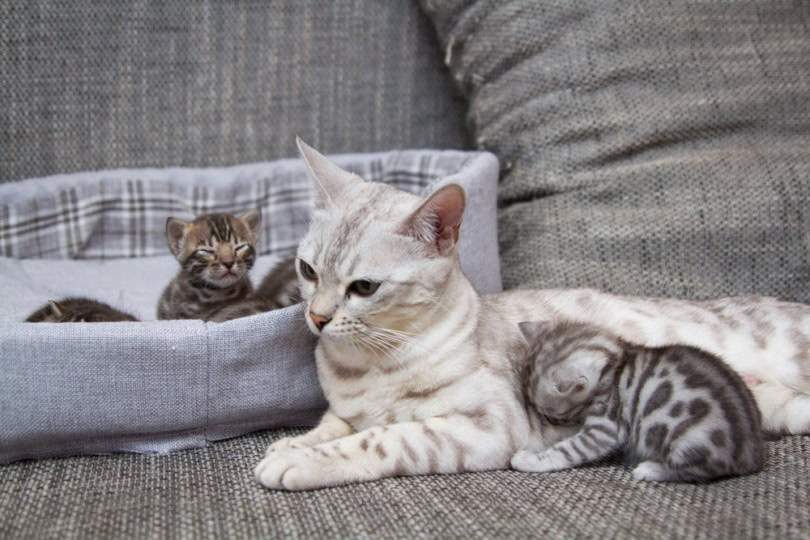
What Is the Maximum Number of Kittens a Cat Can Have?
The maximum number of kittens that a cat can have in one litter is generally around 12, although there has been a reported case where a cat has given birth to a litter of 19 kittens! Complications during delivery can occur regardless of the size of the litter, so veterinary guidance is valuable well in advance of the expected due date.
How Long Is a Cat in Labor?
A cat’s labor usually takes anywhere from 4 to 16 hours. That said, it can take longer, depending on the size of the litter and whether there are any complications during delivery. It’s important to keep an eye on your cat during labor and be prepared for a possible emergency if needed.
Please be aware, though, that some cats are in labor for as little as four hours! So don’t panic if your cat has her litter a lot sooner than the norm. Still, be mindful of any complications and act accordingly.
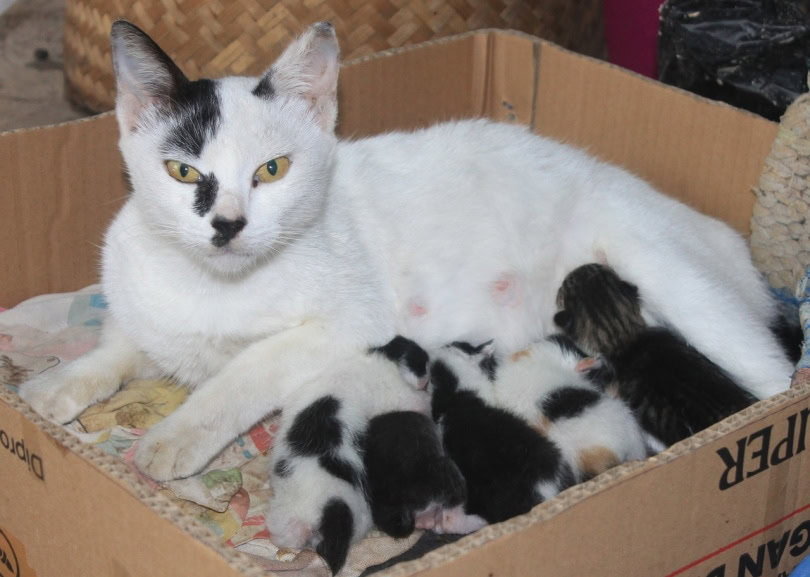
How Rare Is a Single-Kitten Litter?
Single-kitten litters are not that common, but they can and do happen! And when they do, there’s generally no cause for concern. However, it may also be that your cat is still not finished giving birth, so observe them closely for the next few hours and make sure they are not experiencing any signs of birthing difficulties.
Should I Stay With My Cat While She Gives Birth?
As a proud cat parent, it’s only natural that you want to be there for your cat while she’s giving birth. But it’s important to remember that cats are very private animals, and they can sometimes find the presence of humans during labor to be quite intrusive.
If you do decide to stay with your cat, make sure to remain quiet and still so as not to disturb her or the kittens. That said, you really should give your cat as much privacy as possible during this time, while observing from a distance or through a pet camera, to make sure the labor is progressing without any difficulties.
While you may find cat birthing to be interesting, your presence could actually make it a lot harder on your cat if they’re anxious and potentially delay the birth and put the health of her and her kittens at risk. Therefore, it’s best to resist the urge to stay too close to her and instead allow her to give birth in peace. However, some cats are very attached to their owners and may seek their human during this time.
When To Call The Vet?
Although most feline births go well on their own, without any need for assistance, there are certain instances when urgent veterinary advice and attention should be sought:
- If the queen is unwell, lethargic, exhausted, pale, or seems in pain or distress
- In case of green discharge from the vulva without a kitten being passed
- If the queen is bleeding from the vulva, with more than just a few drips
- If a kitten or the sac is stuck in the birth canal
- If the queen is straining for more than 20 minutes without producing a kitten
- If any of the kittens are stillborn
- If the kitten is bleeding from the umbilical cord (tie the cord using any type of suture material and call the vet for advice immediately)
- If the cat’s due date has passed without her getting into labor

How to Provide the Best Care to Your Cat and Her New Kittens
So, your feline friend has just given birth to a litter of adorable fluff balls. Congratulations! But now comes the hard part—providing proper care for your cat and her newborn kittens.
No matter how many babies your kitty has brought into the world, they all need special TLC to ensure they get off to a strong start in life. Here are some tips on how to provide the best care possible for both your momma cat and her new little ones:
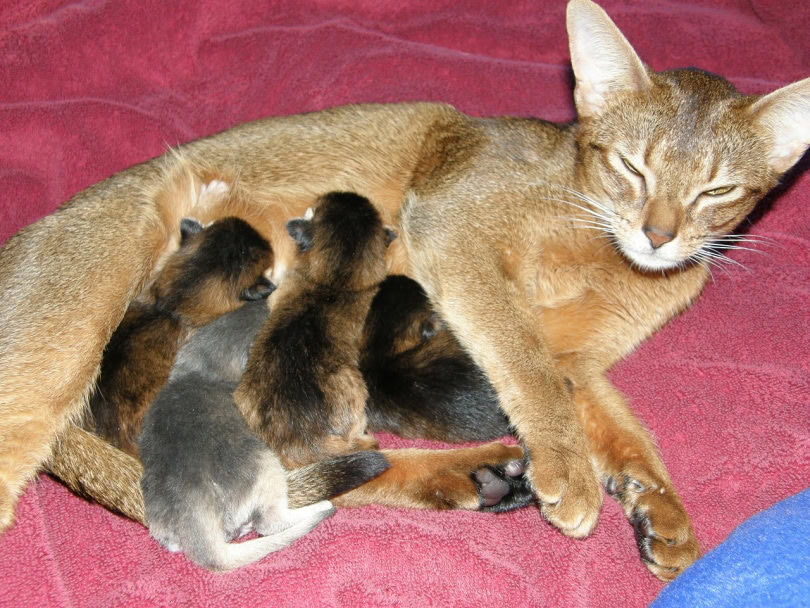
Allow for Room to Breathe
First, make sure you’re allowing momma time away from her kittens so she can eat, drink, use the toilet, and rest properly. A healthy diet is absolutely essential for an expectant—and nursing—mother, so make sure you’re providing a balanced diet for her. Speak to your vet about appropriate nutrition during pregnancy and nursing. In the first few weeks, the mother’s food should be in the same area where the kittens are kept, as they will be nursing from her often and she may be reluctant to leave them. Keep her litter box and water bowls nearby as well.
You’ll also want to give the newborns their own space to grow and explore without overcrowding them. The ideal litter size is four, but that number can vary by a wide margin. And there’s generally no harm in a cat giving birth to more or fewer kittens.
Keep Them Clean, Warm, and Comfortable
It’s important to keep the area where the kittens are born clean and free of debris, birthing fluids and discharge, urine, and feces. This will be an important task to perform several times per day. Check regularly to make sure their bedding is warm, dry, and comfortable, too. For the first 3 weeks, the temperature should be kept at around 90℉ as kittens are not yet able to thermoregulate.
Provide Socialization and Mental Stimulation
Your new little ones need mental stimulation just as much as physical care! Once they’ve reached about five weeks of age, they should be ready to start playing and exploring confidently. So provide your kitty’s litter with plenty of toys and stimulating activities to keep them engaged, and spend plenty of time with them, getting them used to human interaction.
Kitten-Proof Your Home
When the kittens are ready to start exploring, you can expect to have some very curious creatures on your hands. As a result, they’ll be getting into everything. And we mean EVERYTHING!
So, it’s important to kitten-proof your home in advance! Identify potential hazards like cords, open windows, and other dangerous objects, then take steps to make sure the kittens can’t get close to them.
With these tips and a little bit of love, you can ensure your cat and her newborn kittens are well taken care of from day one!

Final Thoughts
With a bit of foresight, veterinary advice, and a lot of care, you can ensure your cat and her litter of kittens have everything they need to thrive.
The number of kittens in a single litter can vary greatly, but no matter how many she has, it’s important to provide her with the proper nutrition, clean and comfortable surroundings, mental stimulation, and even a few toys! And above all else, give your kitty and her babies plenty of love and attention. Happy kitty parenting!
- Pet MD
- How Many Kittens Can Cats Have? | PetMD
- Pregnant cats, birth and care of young kittens
- Reproductive patterns of pedigree cats – PubMed
- Difficult cat birth: when to wait and when to worry | International Cat Care
- Cat labour – a guide to your cat giving birth – PDSA.
- Raising Orphaned Kittens, Warming & Feeding – Park Road Veterinary Clinic
- Guinness World Records
- Hills Pet
Featured Image Credit: Rashid Valitov, Shutterstock
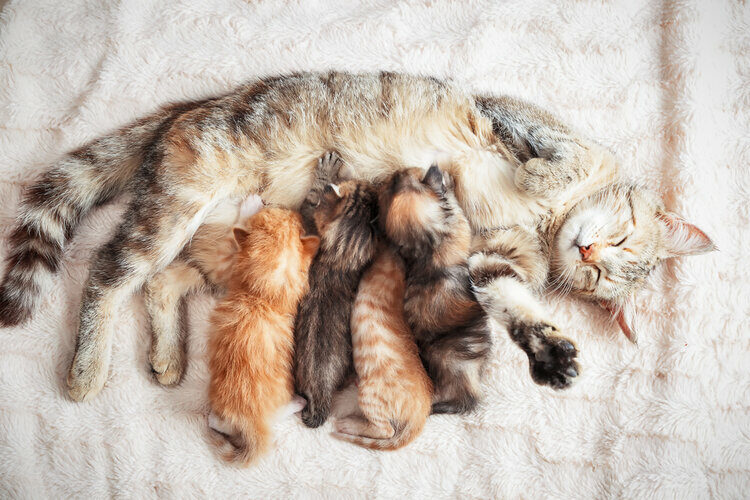





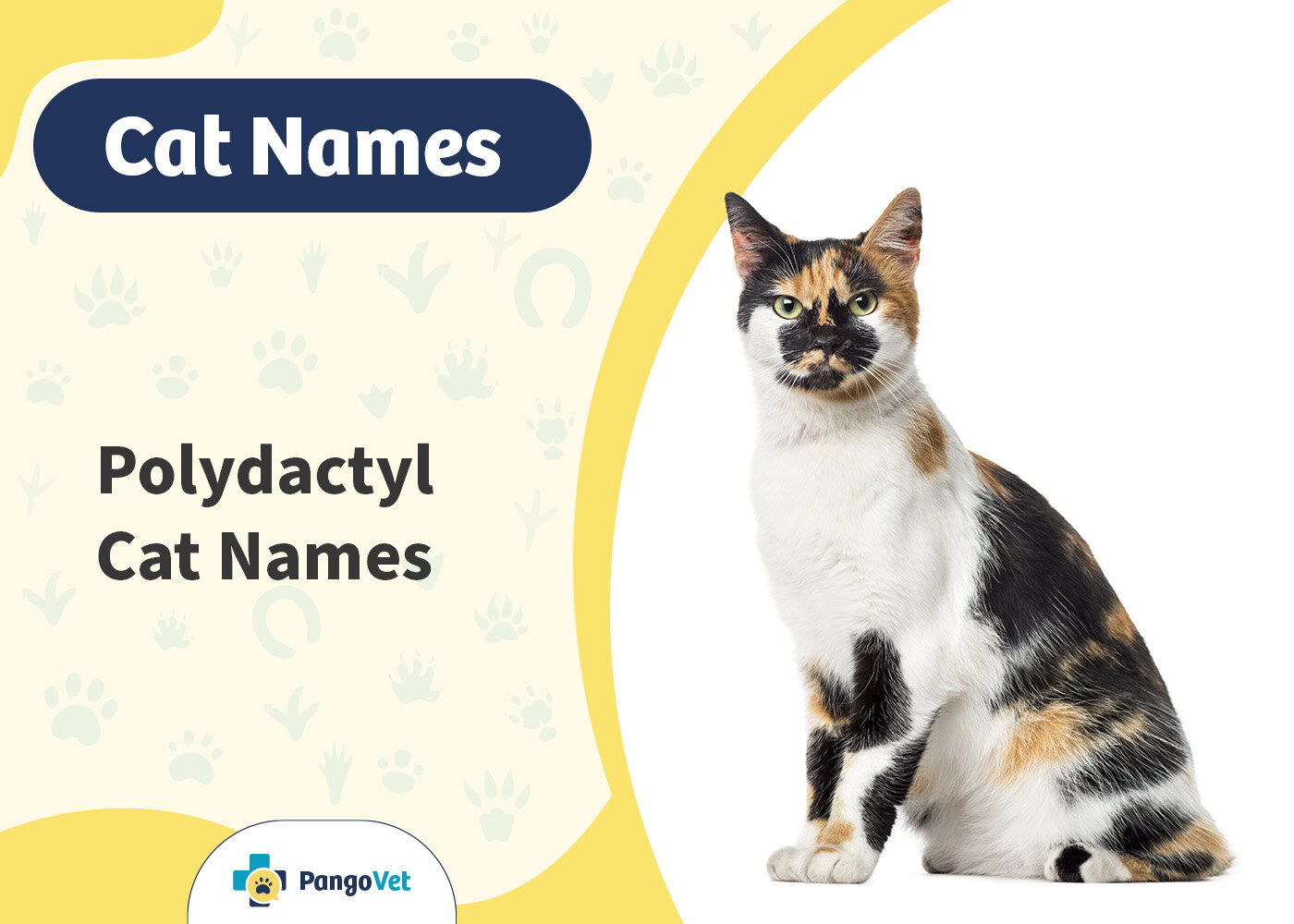
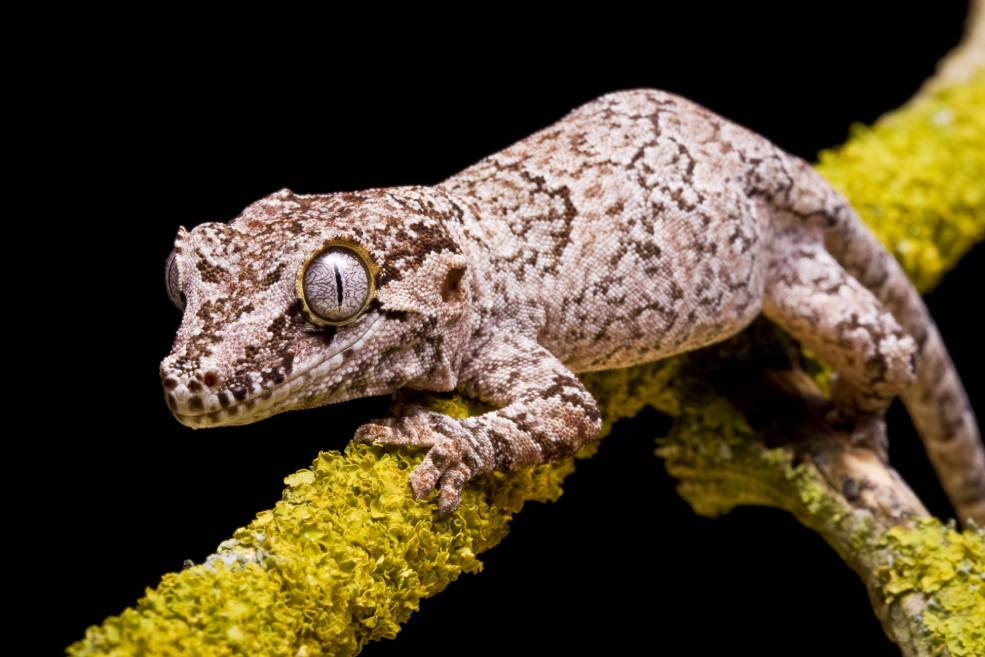




4 Responses
I have a feral cat and I think she’s in labor! She acted very weird and she has gone under a chair on my porch! I did make a clean bed for her! I am not sure what to do, if anything! I have two inside cats so I don’t think I could bring them inside! I’m a wreck any advice is appreciated. Thank you!!
Hello Linda,
thank you for your message. Determining whether a cat is pregnant can be tricky, especially in early phases, however cat coming to a labor should be easily recognized by the belly. If the cat is hiding and trying to find a place to give birth to her kittens (nesting), the best you can do for her is provide her with safe, comfortable and clean nest and in addition easily accessible fresh water and food. Feral cats are very capable of taking care of themselves, so providing the cat with comfort and basic necessities should be more than enough.
Hope this helps and good luck to both of you!
Thank you for your help, we now have 3 beautiful babies and she is the best mom! I worry about their safety, however, she is very much a sweet mom and a dog came by and she sure protected them!! Now I need to find out when they all can be spayed! I don’t know their gender yet!! Thank you
Hello Linda,
we are very happy to read about your kittens! That must be such a joy. Good luck to all of you and thank you for your lovely message!